The automotive industry is undergoing a transformative phase in the United States, especially in light of the potential for escalating tariffs under the Trump administration. While tariffs can be seen as a tool for protectionism, they also carry the risk of significant repercussions for the players involved, particularly foreign automakers from South Korea and Japan. This article analyses the potential impacts of such tariffs on the automotive market, focusing on South Korea and Japan — two key players in U.S. vehicle imports.
In recent years, South Korea has solidified its position as a major exporter of vehicles to the United States. According to recent data, in 2024, South Korea accounted for approximately 8.6% of vehicle sales in the U.S., cementing its status behind only Mexico. Major automakers, such as Hyundai and Kia, have emerged as front-runners in this competitive environment. The strong growth trajectory of South Korean automotive exports can be attributed to a combination of competitive pricing, innovative technology, and diverse offerings that appeal to American consumers.
Hyundai, particularly, has increased its market share significantly, with reports indicating that its U.S. sales of South Korean-produced vehicles more than doubled from 173,000 units in 2019 to over 407,000 units last year. This surge highlights not only the growing popularity of their models but also underscores the economic interdependencies that have shaped the automotive landscape. Given these trends, the implications of potential tariffs could substantially disrupt a market that is heavily reliant on South Korean exports.
Contrastingly, Japanese automakers, which have traditionally held a strong footing in the U.S. market, seem to be experiencing a decline in their market share. Figures indicate that Japan’s contribution to U.S. vehicle sales has dwindled to 8.2%. While Japanese companies like Toyota, Nissan, and Honda still maintain a loyal customer base, the landscape is changing. Moreover, vehicles imported from Japan already face a modest tariff of 2.5%, which poses an additional challenge in a market increasingly dominated by tariff-free imports from South Korea.
The stagnation in Japanese vehicle sales is further exacerbated by the increasing dominance of South Korean brands. As Japanese automakers grapple with their declining market position, the potential for imposing higher tariffs adds another layer of complexity. Increased taxes could lead to escalated retail prices, diminishing consumer interest and further worsening sales volumes.
The idea of implementing new tariffs raises critical questions about market dynamics and consumer behavior. Tariffs are not merely financial calculations; they have real-world implications for consumers who may face higher prices for vehicles due to increased costs imposed on importers. Industry experts indicate that automakers often pass these additional costs onto consumers, leading to price hikes that could dampen demand particularly in a competitive market.
Furthermore, if the Trump administration proceeds with its proposed tariffs, the results could ripple throughout the entire automotive supply chain, affecting not only manufacturers but also suppliers and retailers. The uncertainty surrounding trade policies can create a chilling effect on consumer confidence, ultimately leaving significant breaches in expected sales targets for various players in the automotive industry.
As the automotive industry is inherently resilient and consistently evolves with market demands, experts like Terence Lau argue that while companies can adjust to tariff impacts, this adaptation does not happen overnight. A sudden swing towards higher tariffs would require strategic recalibrations across the board—from production adjustments to pricing strategies. Large companies like Ford have emphasized the importance of a comprehensive tariff policy that is equitable across all international competitors rather than selectively targeting certain countries.
The automotive sector’s capacity for innovation and adaptation will be vital in mitigating the risks associated with tariffs. The industry’s focus on developing economically viable products that resonate with consumer needs reflects a broader understanding of the importance of the global markets in which they operate.
The imposition of further tariffs on South Korean and Japanese vehicles presents significant challenges for the automotive industry in the U.S. Automakers must navigate the complexities of pricing and consumer demand while maintaining their competitive edge amidst shifting regulatory landscapes. The outcome is uncertain, but one fact remains clear: the fate of the automotive industry is closely intertwined with the evolving dynamics of U.S. trade policy.


Leave a Reply